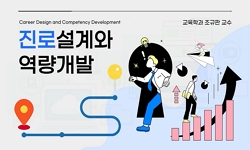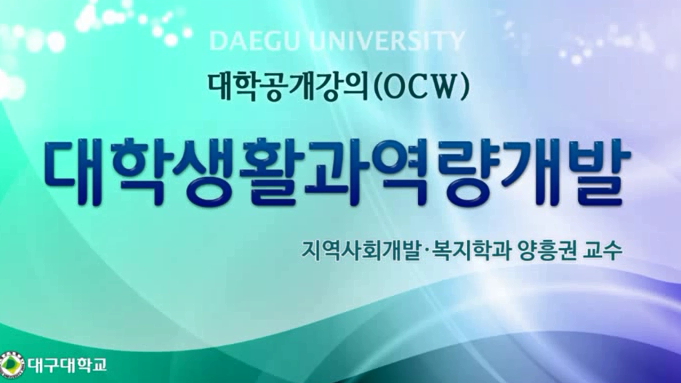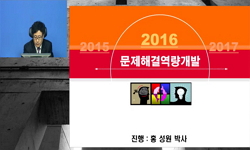The purpose of this study is to analyze the educational needs for the development of the core competencies recognized by the military cadets and to suggest the development model of the core competencies. To accomplish the research purpose, a survey wa...
http://chineseinput.net/에서 pinyin(병음)방식으로 중국어를 변환할 수 있습니다.
변환된 중국어를 복사하여 사용하시면 됩니다.
- 中文 을 입력하시려면 zhongwen을 입력하시고 space를누르시면됩니다.
- 北京 을 입력하시려면 beijing을 입력하시고 space를 누르시면 됩니다.
https://www.riss.kr/link?id=A106881502
- 저자
- 발행기관
- 학술지명
- 권호사항
-
발행연도
2020
-
작성언어
-
-
주제어
사관생도 ; 핵심역량 ; 요구분석 ; 역량개발 ; military cadets ; core competencies ; needs analysis ; competency development
-
KDC
373
-
등재정보
KCI등재
-
자료형태
학술저널
-
수록면
43-63(21쪽)
-
KCI 피인용횟수
0
- DOI식별코드
- 제공처
-
0
상세조회 -
0
다운로드
부가정보
다국어 초록 (Multilingual Abstract)
The purpose of this study is to analyze the educational needs for the development of the core competencies recognized by the military cadets and to suggest the development model of the core competencies. To accomplish the research purpose, a survey was administered to 250 cadets from the K Military Academy in October 2019. A total of 223 valid responses were analyzed using paired t-test to determine whether the mean difference between importance and performance for each capacity recognized by cadets was statistically significant. The results of the analysis showed statistically significant differences in all six core competencies. The quartile chart of the educational needs showed that the competencies of leadership, interpersonal relationship, and self management belong to maintaining area while the competencies of globalism, career development, and creativity belong to concentration area. In order to identify factors that significantly affect education needs of globalism, career development, creativity competencies, four independent variables were included in the multiple regression model: grade, academic major, GPA, hope for long-term tenure, and help-seeking behavior. The results of the multiple regression analysis showed that all of the independent variables were not statistically significant except the help-seeking behavior on the dependent of career development competency which belongs to concentration area. The results indicate that the more help-seeking actions were taken, the smaller the difference between the recognition of importance of career development capabilities and the performance of competency development.
참고문헌 (Reference)
1 심현옥, "훈육관 역량모델 개발" 군건강정책연구소 29 (29): 53-65, 2011
2 최병순, "핵심역량 기반 리더십 프로그램의 개발 및 운영방안-공군영관장교 리더십 프로그램 개발사례를 중심으로-" 7 : 189-217, 2008
3 박혜림, "청소년이 지각한 사회적 지지가 진로준비행동에 미치는 영향- 셀프리더십과 진로개발역량의 매개효과 -" 한국청소년시설환경학회 16 (16): 27-40, 2018
4 김정연, "창의융합 교과목 개발을 위한 대학생의 창의융합역량 차이 비교 및 분석" 한국통합교육과정학회 11 (11): 145-164, 2017
5 박성미, "직업능력의 요소로서 핵심역량 분석" 한국직업교육학회 30 (30): 327-351, 2011
6 조철규, "직무특성이 육군 장교의 직무만족에 미치는 영향요인 연구" 국가안전보장문제연구소 60 (60): 117-148, 2017
7 성민경, "중요도-실행도 분석(IPA)을 통한 사립대학교 대학생의 학습역량에 대한 교육요구도 분석" 교육연구소 37 (37): 73-96, 2016
8 성태제, "제4차 산업혁명시대의 인간상과 교육의 방향 및 제언" 한국교육학회 55 (55): 1-21, 2017
9 신현석, "제4차 산업혁명과 교육행정의 미래" 교육문제연구소 30 (30): 103-147, 2017
10 하정윤, "전문대 유아교육 전공 학생들의 핵심역량 분석 및 IPA 기법을 활용한 전공 및 교직과정 개선 연구" 2 : 91-126, 2015
1 심현옥, "훈육관 역량모델 개발" 군건강정책연구소 29 (29): 53-65, 2011
2 최병순, "핵심역량 기반 리더십 프로그램의 개발 및 운영방안-공군영관장교 리더십 프로그램 개발사례를 중심으로-" 7 : 189-217, 2008
3 박혜림, "청소년이 지각한 사회적 지지가 진로준비행동에 미치는 영향- 셀프리더십과 진로개발역량의 매개효과 -" 한국청소년시설환경학회 16 (16): 27-40, 2018
4 김정연, "창의융합 교과목 개발을 위한 대학생의 창의융합역량 차이 비교 및 분석" 한국통합교육과정학회 11 (11): 145-164, 2017
5 박성미, "직업능력의 요소로서 핵심역량 분석" 한국직업교육학회 30 (30): 327-351, 2011
6 조철규, "직무특성이 육군 장교의 직무만족에 미치는 영향요인 연구" 국가안전보장문제연구소 60 (60): 117-148, 2017
7 성민경, "중요도-실행도 분석(IPA)을 통한 사립대학교 대학생의 학습역량에 대한 교육요구도 분석" 교육연구소 37 (37): 73-96, 2016
8 성태제, "제4차 산업혁명시대의 인간상과 교육의 방향 및 제언" 한국교육학회 55 (55): 1-21, 2017
9 신현석, "제4차 산업혁명과 교육행정의 미래" 교육문제연구소 30 (30): 103-147, 2017
10 하정윤, "전문대 유아교육 전공 학생들의 핵심역량 분석 및 IPA 기법을 활용한 전공 및 교직과정 개선 연구" 2 : 91-126, 2015
11 김재우, "육사생도들의 신체적 역량 강화 방안 연구" 화랑대연구소 71 (71): 167-192, 2015
12 문양호, "육사 생도 리더십 역량 평가의 타당성분석: 입시자료, 심리검사, 생도생활성취도 자료를 중심으로" 리더십학회 5 (5): 69-98, 2014
13 박영선, "수정 IPA를 활용한 대학생 역량 평가 : 서울 S대학 졸업생을 중심으로" 글로벌경영학회 16 (16): 1-20, 2019
14 황지원, "성인 대학생의 핵심역량 수준 진단 및 대학교육에서의 시사점 탐색: 재직자를 중심으로" 핵심역량교육학회 1 (1): 47-78, 2016
15 윤유경, "사관생도의 학업성취 관련변인 연구" 38 (38): 97-107, 2000
16 박상중, "사관생도의 리더십 향상을 위한 리더십평가지수 개발에 관한 탐색적 연구" 리더십학회 7 (7): 61-86, 2016
17 강용관, "리더십 개발 프로그램의 효과성에 관한 연구" 34 (34): 113-143, 2017
18 신소영, "디지털 리터러시 측정도구 개발 및 타당화 연구" 학습자중심교과교육학회 19 (19): 749-768, 2019
19 송창용, "대학졸업자의 자기관리역량과 노동시장성과" 핵심역량교육학회 2 (2): 47-67, 2017
20 김연희, "대학생이 인식하는 핵심역량과 교육요구도 분석" 한국교육방법학회 22 (22): 1-20, 2010
21 성민경, "대학생의 핵심학습역량에 대한 인식분석 및 역량강화 프로그램개발을 위한 연구" 원격교육연구소 11 (11): 171-188, 2015
22 김명숙, "대학생의 학습참여가 지각된 창의성역량에 미치는 영향" 한국영재교육학회 13 (13): 83-106, 2014
23 김지숙, "대학생의 학습역량 진단 연구 : 중요도와 실행도의 차이 분석을 중심으로" 교육연구소 37 (37): 97-125, 2016
24 남창우, "대학생의 계열 및 학년별 비인지적 핵심역량 차이 분석: 자기관리 역량 및 대인관계 역량을 중심으로" 대한사고개발학회 12 (12): 91-118, 2016
25 전예원, "대학생의 개인 및 학교생활 변인이 핵심역량 변화에 미치는 영향" 서울대학교 대학원 2014
26 진미석, "대학생 핵심역량 진단체제 구축 방안 연구" 한국교육행정학회 29 (29): 461-486, 2011
27 정윤숙, "대학생 핵심역량 기반 맞춤형 비교과 프로그램 개발" 한국교양교육학회 13 (13): 293-321, 2019
28 김정주, "대학생 창의역량 요구분석에 기초한 대학 교육과정에의 함의" 1 (1): 1-24, 2018
29 박가열, "대학생 진로개발 역량을 위한 교육요구 분석" 한국진로교육학회 22 (22): 181-198, 2009
30 박수정, "대학 특성화에 따른 대학생 핵심역량 진단도구 개발" 한국직업능력개발원 19 (19): 79-107, 2016
31 성희진, "대학 졸업예정자의 경력개발역량과 경력탐색행동 및 대학경력개발지원의 관계" 한국농·산업교육학회 44 (44): 83-108, 2012
32 김정민, "대학 신입생의 핵심역량에 영향을 미치는 행정적 지원, 정서적 지원, 사회적 지지간의 구조적 관계 분석" 한국웰니스학회 12 (12): 251-261, 2017
33 김동일, "대학 교수가 바라본 고등교육에서의 대학생 핵심역량: 서울대학교 사례를 중심으로" 교육연구소 10 (10): 195-214, 2009
34 이종구, "대기업 면접전형의 유형 및 특성에 관한 시대별 비교・분석" 한국경영사학회 28 (28): 81-109, 2013
35 서송화, "국군간호사관생도의 재난인식, 재난준비도와 재난간호역량" 군건강정책연구소 36 (36): 61-70, 2018
36 함남혁, "국가직무능력표준(NCS) 기반 교육과정 개발 및 운영에 관한 연구 : H사이버대학 부동산도시미래학부 사례를 중심으로" 한국콘텐츠학회 16 (16): 694-711, 2016
37 이영환, "교양교육을 위한 대학의 핵심역량 개발 과정 연구" 한국교양교육학회 13 (13): 181-198, 2019
38 정경균, "관광관련 전공 대학생들의 자기결정성이 취업준비행동에 미치는 영향에 있어 사회적지지의 조절효과에 관한 연구" 한국관광산업학회 44 (44): 217-240, 2019
39 조영아, "고등학생의 진로개발역량과 진로준비행동 및 사회적 지지의 관계" 한국농·산업교육학회 45 (45): 53-77, 2013
40 최선영, "간호사관생도의 생도생활적응 영향요인 : 스트레스, 자아존중감, 자아탄력성" 군건강정책연구소 32 (32): 1-13, 2014
41 김민정, "‘역량기반’ 대학교육의 통치성에 대한 비판적 고찰" 한국사고와표현학회 12 (12): 195-220, 2019
42 Siniscalchi, J. M., "Using importance-performance analysis to evaluation training" 47 (47): 30-35, 2008
43 Tian, J., "The leadership competency modeling of military academy cadets" 37 (37): 525-537, 2009
44 McClelland, D. C., "Testing for competence rather than for intelligence" 28 (28): 1-14, 1973
45 Bundick, M. J., "Student Perceptions of Teacher Support and Competencies for Fostering Youth Purpose and Positive Youth Development : Perspectives from Two Countries" 18 (18): 148-162, 2014
46 Bucey, J. C., "Strengthening School-Based Occupational Therapy through Peer Mentoring" 11 (11): 87-105, 2018
47 Cohen, S., "Positive events and social supports as buffers of change stress" 13 (13): 99-125, 1983
48 Engels, D., "Peer Teaching beyond the Formal Medical Curriculum" 42 (42): 439-448, 2018
49 White, R., "Motivation reconsidered : The concept of competence" 66 : 297-333, 1959
50 O'Neill, M. A., "Importance-performance analysis : a useful tool for directing continuous quality improvement in higher education" 12 (12): 39-52, 2004
51 Martilla, J., "Importance-performance analysis" 41 (41): 77-79, 1977
52 Abalo, J., "Importance of values for importance-performance analysis : a formula for spreading out values derived from preference rankings" 60 (60): 115-121, 2007
53 McClelland, D. C., "Identifying competencies with behavioral-event interviews" 9 (9): 331-339, 1998
54 Hugo, H., "Global and National Prominent Universities : Internationalization, Competitiveness and the Role of the State" 58 (58): 387-405, 2009
55 English, J. A., "Digital Literacy Initiative in Honors : Perceptions of Students and Instructors about Its Impact on Learning and Pedagogy" 17 (17): 125-154, 2016
56 Person, A. E., "Competency-Based Programs as a Lever for Reforming Core Areas Jointly: New Directions for Community Colleges" Josey-Bass 2016
57 Borich, G. D., "A needs assessment for conducting follow-up studies" 31 (31): 77-86, 1980
동일학술지(권/호) 다른 논문
-
강원도 내 탈북 청소년 학습자의 문식성 향상을 위한 기초 연구
- 학습자중심교과교육학회
- 오현아(Oh Hyeonah)
- 2020
- KCI등재
-
유아미술교육에서 교수 감성리더십이 예비유아교사의 학습몰입 및 태도에 미치는 영향
- 학습자중심교과교육학회
- 이신주(Lee, Shin ju)
- 2020
- KCI등재
-
간호대학생의 부적응적 완벽주의와 임상 실습 스트레스의 관계에서 인지적 정서조절전략의 매개효과
- 학습자중심교과교육학회
- 이윤정(Lee Yoon-Jung)
- 2020
- KCI등재
-
- 학습자중심교과교육학회
- 최미순(Choi, Mee-Soon)
- 2020
- KCI등재
분석정보
인용정보 인용지수 설명보기
학술지 이력
| 연월일 | 이력구분 | 이력상세 | 등재구분 |
|---|---|---|---|
| 2027 | 평가예정 | 재인증평가 신청대상 (재인증) | |
| 2021-01-01 | 평가 | 등재학술지 유지 (재인증) |  |
| 2018-01-01 | 평가 | 등재학술지 유지 (등재유지) |  |
| 2015-01-01 | 평가 | 등재학술지 유지 (등재유지) |  |
| 2011-01-01 | 평가 | 등재학술지 유지 (등재유지) |  |
| 2008-01-01 | 평가 | 등재학술지 선정 (등재후보2차) |  |
| 2007-01-01 | 평가 | 등재후보 1차 PASS (등재후보1차) |  |
| 2006-01-06 | 학술지명변경 | 외국어명 : Journal of Learner-Centered Curriculum and Instruction -> The Journal of Learner-Centered Curriculum and Instruction |  |
| 2006-01-01 | 평가 | 등재후보학술지 유지 (등재후보1차) |  |
| 2004-01-01 | 평가 | 등재후보학술지 선정 (신규평가) |  |
학술지 인용정보
| 기준연도 | WOS-KCI 통합IF(2년) | KCIF(2년) | KCIF(3년) |
|---|---|---|---|
| 2016 | 1.29 | 1.29 | 1.31 |
| KCIF(4년) | KCIF(5년) | 중심성지수(3년) | 즉시성지수 |
| 1.37 | 1.42 | 1.436 | 0.33 |




 스콜라
스콜라






